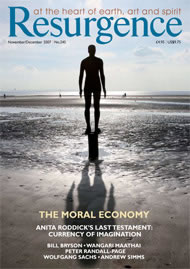WE ARE IN the middle of an aesthetic revolution. It concerns the relationship of the arts to the biosphere. It is a revolution that would have us heed – and as a matter of the greatest urgency – the connections and continuities between human life and natural life and to grasp their radical interdependence. As with all revolutions, this one is rooted in past movements – especially Romanticism – and such towering historic figures as Goethe, Wordsworth and Ruskin who, in their own distinctive ways, were committed to re-affirming an essential communion between the spirit of human life and the innate tendency towards form in Nature. The current revolution, now making its way through all the arts, is conspicuously a response to the cataclysmic prospects we face before the unholy trinity of global warming, over-population and the grim depletion of natural resources. Against the emerging catastrophe, the new eco-aesthetics cries out for a new covenant with Nature.
There can be no doubt that Lynne Wycherley’s new volume of poems is written out of this impending sense of ecological disaster. The dedication reads as follows: “I dedicate this book to the biota of the north isles – lichens, moss, insects, grasses, blue hare, geese, whimbrels, terns … all the minutiae such lives stand on – and above all, the whales.” The orientation is as unambiguous as it is marvellous. In a memorable stanza she writes:
I touch history: taste loss.
Sandwhales extinct. We
are architects of an empty house.
The flight north promised by the title is a flight into “the arctic absolutes”, into “a place of hard purity”, into a night sky of sharply edged stars, into a day landscape of arctic flora, of gleaming ice and dark magma. During the day objects stand out with a gleaming blade-like intensity, while at night they possess a saga-like mystery and are often lit up by the primitive power of flame. In ‘Ship Burning’ the energy of fire is expressed like this:
The carved head cuts the night,
lappets streaming.
The wind crackles gold flags,
Thiassi’s wings, Sleipnir’s mane,
flames’ mutations
flung against the black.
Here energy and myth come together, as they do later, when the sparks climbing the air enter “Heimdall or a quantum god”.
The journey north is not confined, however, to the literal geographical north – to Orkney, Shetland and Iceland. There is, also, a literary cartography in operation. The poems, with great economic imagination, explore the lives of other eco-poets: John Clare (particularly in relationship to his late journey north out of London),George Mackay Brown, Edwin Muir and William Morris. There is a short narrative poem about Morris’ journey north in 1871 where the poet, escaping the emotional pain of his life at Kelmscott, has to confront the lashing austerities of Iceland:
Hail draws white lines across
my spirit. Shattered, numb,
I wait for Baldur to stir in the sun.
Of Wycherley’s eco-retellings the most resonant is ‘Darwin Waits for his Wife’. In this subtle poem the plight of Darwin – unable to believe in God, suffering the death of his most loved daughter, believing in the beauty of
evolution, respecting his wife’s Christian piety – is caught with considerable pathos:
Dear God, mute ghost: I would not
Give Him up, but events orphan me.
I see Annie: her face is closed.
Emma, I am lonelier than you know.
Darwin’s predicament here seems to have become ours.
And there is a third level to the journey north. This level is deeply auto-
biographical. It is the voyage of the author’s spirit, not only out from the Fenlands, where she was born, into the wider world of Orkney, Shetland and Iceland but, also, and more significantly, into a broader poetic commitment – into a sensitive engagement both with the living minutiae of Nature and with the primordial forces underlying their articulation. The book records with eloquence an ecological way of being within the encompassing biosphere.
The poem that expresses this involvement most memorably is ‘Fire Child’. It plots the life of the volcano Surtsey alongside the life of the poet, stage by stage, to secure a sense of fusion between the passing personal and the deep impersonal, between temporal identity and primordial Nature. Concentrated into five sparse lyrical stanzas, it is one of the most striking eco-autobiographies I have read.
The three criss-crossing threads of the geographic, the literary-historic and the intimate autobiographical make this volume a complex achievement, and what is so satisfying is that the large ecological concerns are not stated in a abstract conceptual manner for the mind to reason with, but are made to soar in the incomparable manner of good poetry: through the vibrations of honed cadence and the unexpected meetings of deep metaphor. In this way the poems bypass casual speculation and penetrate deep into the imagination.







